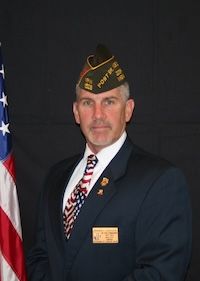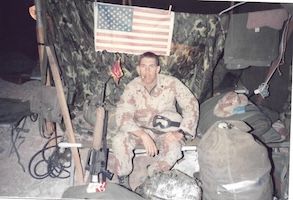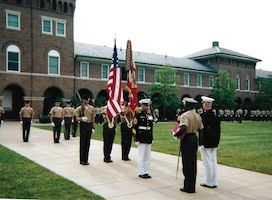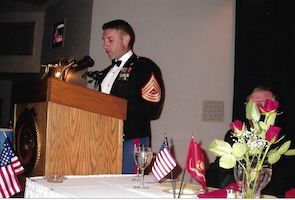| VFW Connections |
|
 |
Randy first came to the VFW in 1999 to join the Combat Veterans Motorcycle Club. When his military duties allowed him to spend more time locally, he visited frequently. He credits John Dodge and Tom Gimble as mentors, as they encouraged him to get involved with leadership at the post. Randy served as Post Commander two consecutive years between 2014-2015 and 2015-2016, earning All American Status. He also moved through the District chairs, elected as District Commander from 2018-2019. As his retirement approaches, he has also started to support the State positions, currently serving as the Inspector.
Many will also know Randy as a long-term bingo caller. He started in 2000 and recently retired as a regular caller, although he still pops in when he is needed. Additionally, Randy has been a member of the Military Order of the Cootie (MOC) since 2003. He also supports the many events at the post throughout the year.
|
Born in Anderson, South Carolina, Randy and his younger sister spent their early years in small-town America. His father worked in a catering business and his mother had a job as a banker.
Randy didn’t take school very seriously, as he was much more interested in socializing with his female peers. However, he did enjoy reading, and he especially liked action comic books like Spiderman. He also enjoyed playing on his school’s football team.
When his parents divorced, Randy lived with his mother and his grandmother. However, they were quite strict and they didn’t approve of his "teenage mischief,” like sneaking into concerts and hiding away to drink beer with his friends. Eventually, Randy made the decision to move in with his father in Colombia, about two hours away. He soon learned that his father was also displeased with Randy’s youthful indiscretions. He told Randy to come up with a plan for what he was going to do after he graduated, giving him the options of working full-time, continuing with his schooling, or joining the service.
Because Randy’s stepbrother had enlisted in the Marine Corps before being medically discharged from boot camp, he felt that it was worth looking into a career in the military. Randy and his father went to "the row of recruiters” from the different branches. Although Randy already had the Marine Corps in mind, he was worried that it would be tough for him. However, when Randy saw the dress blues on display, and the Marine recruiter reassured him that he was athletic enough to do well, he was hooked.
Since he still hadn’t finished high school, Randy signed up for a delayed entry. That meant that he would be able to graduate, take a summer trip to the beach, and then head to boot camp. In September of 1981, Randy shipped out to Fort Jackson to swear in for service and then took a bus ride to Parris Island.
Although boot camp was a challenge, Randy notes that he was able to lay low and knew when he shouldn’t speak to the intimidating drill instructors. Since he had always been a strong runner, he was able to keep up with the demanding physical tasks.
From there, Randy went to Camp Lejeune for a few months, working in logistics. In 1982, he received orders to Okinawa, Japan. He spent a year there, traveling to Korea a few times for additional training.
After his year in Japan, Randy was sent to Twentynine Palms Base in California. It was there he would meet Karla. She was also serving as an active-duty Marine at the time. They dated before marrying in 1984, completing their time at 29 Palms together.
They received joint orders to Air Station Beaufort in South Carolina, where their first daughter was born in 1985. In 1986, he was promoted to sergeant (E-5). His first sergeant noted that Randy was a good leader, encouraging him to think about becoming a drill instructor. After giving it some thought, Randy put in his packet and was selected. He attended drill school in 1987 before heading back to Parris Island as a drill instructor. The next two years required long hours, often taking him away from his family which now included another newborn daughter. However, Randy noted how rewarding it was to experience boot camp from the other side and seeing individuals transform from civilians into basically trained Marines in 11 weeks.
Since drill instructors are given the option of choosing their next duty station, Randy and Karla opted to return to Beaufort—especially as it was only 10 miles away and they wouldn’t have to move. Randy was part of Marine Air Control Squadron 5 (MACS-5) as a staff sergeant and continued working in logistics.

In August of 1990, Randy and Karla took the girls to see Karla’s family in Minnesota. While on leave, Randy received a call that there was a 100% recall: the beginning of Desert Storm. Randy packed his seabag and headed to the flightline squadron. He soon learned that they were in a holding pattern, which is how they would remain until December. While this allowed him to work on standby and be with his family, he had to be prepared to leave at any moment. Finally, on his birthday—December 22, 1990—they shipped out. Randy was part of the Helicopter Support Squadron 273 (MWSS-273).
MWSS-273 initially started their tour in Saudi Arabia in the Port of Al Jubail, a relatively safe location that provided some time to acclimate. However, as they moved further north, the situation quickly became dangerous. Randy and the others even had to sleep in their "mopp gear,” a suit designed to protect them from nuclear, radiological, biological, or chemical hazards. He was able to send letters home at the start, but eventually communication ceased as they moved into the heart of Kuwait. Randy also broke his foot when a piece of AM2 Matting—sections of which are assembled like a puzzle to form a portable aircraft operating surface, especially in locations with deep desert sand like Saudi Arabia—was dropped on his foot. The group returned home in June, a transition that felt "surreal.”
However, Randy's time in South Carolina was short-lived. Just three months later, the group was sent to Somalia to be part of a peacekeeping force. Although their initial role was to distribute food to counteract the deep famine after a military coup, the violence enacted by local warlords quickly destabilized their mission. Randy remained in Somalia for three months before returning to Beaufort.
In 1992, Randy and the family headed to Okinawa for a three-year assignment. The girls were able to attend school on Camp Kinser, and they all loved their apartment on the 15th floor of a high-rise building overlooking the ocean. They immersed themselves in many cultural activities and even got scuba certified.
Upon their return in 1995, Randy signed up to be an assistant Marine instructor at the University of Minnesota. Now a gunnery sergeant, he worked at the college with a Captain as the staff for the ROTC program. Additionally, as Randy had been a prior drill instructor, he was required to travel to Quantico to be a summer instructor. Randy loved that he was given the opportunity to train "both ends of the spectrum” for the Marine Corps. There, he spent six weeks training future Marine officers, evaluating them for their leadership potential.
Toward the end of the summer training, the group would travel to Marine Barracks, also known as "8th & I,” as it’s located in Washington, D.C. at the corner of 8th Street and I Street. There, they would watch the Silent Drill Platoon’s parade, a precision drill sequence. As the time approached for a new duty station, Randy asked a company first sergeant how someone could get assigned on orders there. He was told that a position would be opening soon, and Randy shared his information with their leadership. Within a month, Randy had orders to the Marine Corps Institute.
As he started at his new job, Randy realized that he was tasked with sitting in a cubicle to write logistics training courses for Marines. Since this wasn’t what he was really interested in doing, he again asked how he could potentially serve across the street with one of the marching companies. He was given permission to interview with a commanding officer. They had an opening for a gunnery sergeant coming up, so he told Randy that he could have the position if he had permission to be released.
When permission was granted, Randy was assigned to Company B for a year. This group traveled frequently, as they served as the Marine Corps’ Body Bearers Section. After this year, he transitioned to Company A, the Silent Drill team. This also included a lot of travel, but Randy was thrilled to have the position.

During his third year with the group, Randy discovered that he was being promoted to a master sergeant instead of a first sergeant. Although these are both E-8 ranks, he had hoped to be a first sergeant, since that position would put him in charge of personnel. Randy received orders to Camp Lejeune, but as he was hitting 19 years of service, he told them that he wanted to stay where he was to end his career. Randy was told that he would have the option to refuse these orders, but he would be required to retire after that year. He agreed, and he was assigned to operations. Randy describes this as the "pinnacle” of his career, as he was right in the middle of the parade and attended many special military events.
Randy requested to retire during the rehearsal for the last parade of the season in August. Although the drill team usually didn’t do a full routine during practice, they did so for his retirement. The drum and bugle corps also participated in a full routine, playing Randy's favorite ceremonial song: "Just a Closer Walk With Thee.”
 Since the family had put down roots in Northern Virginia—especially with the girls attending high school in Stafford—they decided to stay in the area. After his retirement, Randy worked in Prince William County for a couple years as a building code inspector. He obtained his real estate license and worked as an agent for a time. Eventually, he moved on to taking a federal government position for the next 16 years. (He will officially retire in December of 2024.)
Since the family had put down roots in Northern Virginia—especially with the girls attending high school in Stafford—they decided to stay in the area. After his retirement, Randy worked in Prince William County for a couple years as a building code inspector. He obtained his real estate license and worked as an agent for a time. Eventually, he moved on to taking a federal government position for the next 16 years. (He will officially retire in December of 2024.)
After retirement, Randy and Karla hope to take a camper out west to explore the natural parks and travel at their own pace.
- When Randy was about nine years old, he decided he wanted to "play Evel Knievel” with his six-year-old sister. He had her lie down on their slanted driveway with a 2’ x 12’ board over her held up by a brick. His mom discovered his plan to jump over her with his trick motorbike, and he got in trouble for endangering his sister.
- Shortly after Randy had signed up for a delayed entry with the Marine Corps recruiter, he was relaxing at the pool with his stepbrother at his dad’s townhouse complex. They had snuck in a few beers, and Randy was trying to impress some girls. Randy decided to jump backward into the pool, not realizing he was by the shallow end. When Randy came up for air, blood poured down over his face. Although his stepbrother told him that he should get medical attention, Randy was fearful that he wouldn’t be allowed to go to boot camp. Both boys got in trouble when his dad learned about the injury and the alcohol.
- As a teen, Randy played the drums and met up with other local boys to jam together, mostly with classic rock songs. He currently has a drum set that he still occasionally plays.
- When Randy was in boot camp, he discovered that there were two other recruits with the same last name. Although "Coker” isn’t a very common surname, he didn’t know them, and he never saw them again after boot camp.
- Shortly after becoming a drill instructor at Parris Island, Randy had just picked up his new platoon. Although Karla was very pregnant and in the hospital, Randy had to get the recruits ready for "hell day.” A few hours later, he was told he had an important phone call. It was a nurse at the hospital telling Randy that his wife and newborn daughter were ready to come home! He had to excuse himself for the rest of the day to be with his family.
- While in Japan, the family took part in a conversation and culture exchange. Karla sponsored a group of ladies to visit their home to practice their conversational English. In return, Karla would visit them with the two girls. The ladies would dress them in kimonos and do their hair, much to everyone’s delight.
- On September 11, 2001, Randy decided that he would take a long bike ride with a couple Marines on the C & O Trail. When they reached White’s Ferry Crossing, they noticed the parking lot was quite full. A crowd was huddled in front of the small television inside, and one of the visitors told the trio that a plane had crashed into the World Trade Center. Suddenly, they received a call from Headquarters stating there was a mandatory recall. They explained that they were miles into the bike trail and would need to get to Harper’s Ferry for their car. They were given permission to do so, finding the parking lot to be deserted when they arrived. They were allowed to retrieve their vehicle and headed back with everything on shutdown status.
